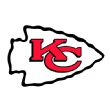It sure was a fun ride with Von Miller, John Elway and the Denver Broncos the past month and a half.
The NFL's franchise-tag rule, which allows teams to keep their top players off the market while negotiating long-term deals with them, made for some particularly interesting theater in Miller's case. There were weird deadlines set by the team more than a month ahead of the real one. There was an Instagram post in which Miller cut Elway out of the picture to express his displeasure with what he would later refer to as "some of the tactics" Elway was using in negotiations.
In the end, it all worked out, as it always seemed it would. Miller and the Broncos signed a six-year, $114.5 million contract extension Friday, just a couple of hours before the deadline, and now everyone is happy. The franchise tag gave us all something to talk and write about during the slow summer months of NFL coverage, and for that we are grateful.
But we got to wondering what this all would have been like if there were no such thing as the franchise player designation. What if that rule simply didn't exist? How would that have affected Miller, or any of the other players who were tagged this offseason? How would it have affected the market in general?
Before we get too far into this, understand that the franchise tag isn't going anywhere. It has been around since 1993, first installed as an ostensible means of allowing smaller-market teams to keep their stars out of free agency and out of the hands of bigger-market ones. Over time, it has evolved and been used in many different ways, not always consistent with its original intent. But while top players and agents find it odious, as it restricts earnings at the top of the market, 99 percent of NFL players will never have to worry about being tagged, which means it's not an issue the NFLPA is interested in fighting in future negotiations. Players can all agree they don't like it, but they're not about to draw any lines in the negotiating sand over it.
So imagine for a moment that there was no such thing as the franchise tag. Here are a few different ways Miller's past year or two could have unfolded:
1. Miller signs an extension during the 2015 offseason.
Knowing 2015 was the final year of Miller's contract and they had no way of keeping him off the market come March, the Broncos could have moved to extend him last summer, as the Panthers did with Luke Kuechly, or the Giants did with Eli Manning. At that time, Miller probably would have been looking at a deal a little bit north of the six-year, $101 million contract Justin Houston signed last summer with the Chiefs. (Of course, in this alternate reality, Houston would have signed his contract much sooner and likely for more money, since Kansas City couldn't have franchised him in the spring of 2015. But just roll with us here.)
Ndamukong Suh had just blown out the market for defensive players with a six-year, $114.375 million deal from Miami. Since Suh got his deal as an open-market unrestricted free agent, Miller (who had a year to go on his deal) couldn't have expected to get that much. So he'd probably have just beaten the Houston deal and come in around $17 million a year instead of the $19.083 million he got. Look at it that way, and the franchise tag may have helped him. The year he played in the interim saw him add "Super Bowl MVP" to his resume. That pays big, as did the 8.4 percent increase in the salary cap.
2. Miller signs an extension after the Super Bowl but before hitting the open market.
Not knowing Olivier Vernon was going to get $17 million a year from the Giants once he hit the market, Miller probably would still have been negotiating off the Houston deal, though with a little more help. Suh's down year and the cap increase (which in February was still only a "projected" cap increase), along with Miller's brilliance in leading the Broncos to a championship, put Miller in a position to argue to be in the same neighborhood as Suh. Add 8.4 percent to Suh's average annual salary and you get $20.5875 million. Miller's agent likely would have started by asking for that, knowing he wouldn't get it. That's a lower starting point than Miller's agent actually used in real life. He was asking for $22 million per year when negotiations began this summer.
3. Miller waits it out, hits the open market and cashes in big.
What happens if Miller hits the free-agent market in March coming off the year he just had? You saw how crazy teams went when the Dolphins took the transition tag off Vernon. Miller would have been even more coveted, and likely soared well into the $22 million range. The case for paying him quarterback money after what he did last year and in the postseason couldn't have been clearer, and free agency is a time when teams don't even need a great reason to open their wallets. This would have been the best possible situation for Miller, who would have left Suh's deal in the dust and probably set the bar for the Andrew Luck deal that came a few months later in Indianapolis. It's possible, too, that Miller being on the market would have helped others. Maybe Vernon would have done even better, riding Miller's coattails to a deal with one of the teams that didn't win the Miller sweepstakes. Maybe he'd have priced Muhammad Wilkerson out of the Jets' budget, since Wilkerson wouldn't have been subject to the nonexistent franchise tag either.
Of these possibilities, the first is the most likely, since few players like to assume the injury risk that comes with playing out the final year of their contract without an extension. There's no way to know whether the Broncos would have approached Miller about an extension last summer if the franchise tag didn't exist. But if they did, history says they likely could have reached a deal. And it probably would have been a smaller one than the one he ended up getting.
As for the other guys who got franchised this year:
 Kirk Cousins, Washington: Coming off a surprise season, Cousins likely would have fallen into the same free-agent category as Denver's Brock Osweiler -- a quarterback who has shown promise but still isn't a known quantity. Since Houston seemed to be the only team willing to pay Osweiler $18 million a year, it's likely the only way Cousins could have made that much is if Houston had preferred him to Osweiler. It's possible Cousins would have had to take a shorter-term deal in the $16 million-a-year range with Washington. Instead, he makes $19.9 million for one year and has to prove he can do it again.
Kirk Cousins, Washington: Coming off a surprise season, Cousins likely would have fallen into the same free-agent category as Denver's Brock Osweiler -- a quarterback who has shown promise but still isn't a known quantity. Since Houston seemed to be the only team willing to pay Osweiler $18 million a year, it's likely the only way Cousins could have made that much is if Houston had preferred him to Osweiler. It's possible Cousins would have had to take a shorter-term deal in the $16 million-a-year range with Washington. Instead, he makes $19.9 million for one year and has to prove he can do it again.
 Alshon Jeffery, Chicago: After missing seven games due to injury in 2015, Jeffery's best hope may have been a deal like the ones Doug Baldwin and Keenan Allen just signed in Seattle and San Diego. And even that $11.5 million-a-year range may have been tough to convince someone to cough up for a guy who wasn't healthy all season. Instead, he makes $14.599 million for one year.
Alshon Jeffery, Chicago: After missing seven games due to injury in 2015, Jeffery's best hope may have been a deal like the ones Doug Baldwin and Keenan Allen just signed in Seattle and San Diego. And even that $11.5 million-a-year range may have been tough to convince someone to cough up for a guy who wasn't healthy all season. Instead, he makes $14.599 million for one year.
 Eric Berry, Kansas City: Maybe emotion would have carried the day back in March, and Kansas City would have locked up Berry the way the Patriots did Devin McCourty ($9.5 million a year) one year before. But if Berry was looking to be the highest-paid safety in the league, he probably could have scored a $10-plus-million-a-year deal on the open market. Kansas City froze him at $10.806 million for one year, and knowing his tag next year will be almost $13 million set his expectations higher than made the Chiefs comfortable.
Eric Berry, Kansas City: Maybe emotion would have carried the day back in March, and Kansas City would have locked up Berry the way the Patriots did Devin McCourty ($9.5 million a year) one year before. But if Berry was looking to be the highest-paid safety in the league, he probably could have scored a $10-plus-million-a-year deal on the open market. Kansas City froze him at $10.806 million for one year, and knowing his tag next year will be almost $13 million set his expectations higher than made the Chiefs comfortable.
 Muhammad Wilkerson, New York Jets: Everything written about Miller applies here, as Wilkerson was the only other franchise player whose franchise tag number was lower than his market value. He wouldn't have broken any records, but Wilkerson would have done well on the open market, likely securing greater guarantees than the Jets gave him in the extension done Friday.
Muhammad Wilkerson, New York Jets: Everything written about Miller applies here, as Wilkerson was the only other franchise player whose franchise tag number was lower than his market value. He wouldn't have broken any records, but Wilkerson would have done well on the open market, likely securing greater guarantees than the Jets gave him in the extension done Friday.
 Trumaine Johnson, Los Angeles: Former teammate Janoris Jenkins got $12.5 million a year from the Giants, so it's fair to assume Johnson could have got the same from some other team. Corners are in demand.
Trumaine Johnson, Los Angeles: Former teammate Janoris Jenkins got $12.5 million a year from the Giants, so it's fair to assume Johnson could have got the same from some other team. Corners are in demand.
 Justin Tucker, Baltimore: Probably gets the same exact deal he just got, only sooner.
Justin Tucker, Baltimore: Probably gets the same exact deal he just got, only sooner.
